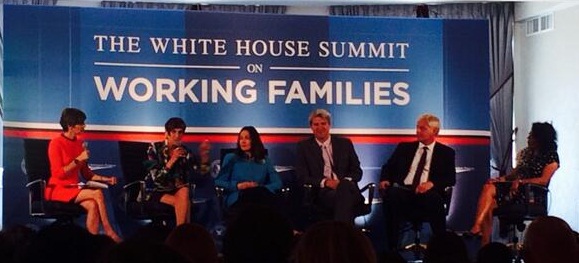The recent White House Summit on Working Families brought national attention to issues facing working families across our country. In the next installment in our series on the Summit, we’re distilling a few key messages from employers who participated in the Summit conversations. What would they tell other employers? What mattered in their decisions to adopt flexible workplace policies? How could companies meaningfully adapt to the 21st century workforce?
- Tone at the top. Mark Weinberger, Global Chairman and CEO of EY (the newly re-branded Ernst & Young) shared a personal story. For him, the decision to become Global Chairman and CEO last year was a family one. When he was offered the position, he asked his family’s opinions and, while being clear about the time and travel responsibilities, made the commitment to still put family first. For his very first speech as Global Chairman, Mark was traveling to China. He prepared, and practiced, and prepared some more. From his account, the speech went well, but no one in the audience remembers it. What they remember instead is that –when asked if he’d be attending the dinner at the Great Wall later that day – he said no. No because his daughter had her driver’s test later that day, and he had promised her he’d be there. After that answer, he received hundreds of positive emails from his staff. Mark realized that he would have passed on his new position if he couldn’t have had the flexibility to prioritize family, and his talent would do the same.
- Tone at the middle. Bob Moritz, U.S. Chairman and Senior Partner of PriceWaterhouseCoopers, expanded on the need to balance priorities and specifically how we must adapt to the newest generation in our workforce: Millennials. Interestingly, he noted that – when polled on their views – both Millennials and Boomers had similar responses, valuing workplace flexibility (about 7 in 10 Millennials, and 6 in 10 Boomers). The difference, however, was how far those workers would act on their value of flexibility. Unlike Boomers, Millennials are willing to leave a company if they don’t get the flexibility that they’re seeking. For Bob, he knew PWC needed to adjust their policies, but he also knew this meant setting – or re-setting the “tone at the middle.” The company policies could change, but he needed his middle-aged management teams to see the value in these changes, and manage their Millennial employees accordingly. That has made all the difference in implementation.
- Transparency and shared ownership work. Dane Atkinson, CEO of SumAll, spoke during a discussion on worker compensation – clearly critical to the economic security of a worker and their family. As a serial entrepreneur, Dane had recently tried something new with his latest company: sharing a list of all salaries with employees. This move was not without its challenges but, as he explained, is a practice that attracts higher levels of talent to his company. Talent is attracted to talent, and a company that they know will value and support them.Kim Jordan, CEO of New Belgium Brewing Company, took another approach: shared ownership. For the craft beer company, that ownership is both literal (employee ownership was phased in and, as of December 2012, the company is 100% employee-owned) and a part of the fabric of their operating culture. They practice “high involvement culture” that includes open book management, inclusive annual strategic planning and a belief “that the collective is stronger than the individual and that informed coworkers will make responsible decisions.” If you read the company’s core values, you’ll see much of the typical aspirations – innovation, continuous improvement, customer value – but also some of the atypical – such as stating a value for “balancing the myriad needs of the company, our coworkers and their families.”
Wouldn’t you like to work for employers that have this vision, and provide these flexible policies? Or if you do already, wouldn’t you like for others to also benefit from this flexibility? These were just a handful of the forward-thinking employers who shared their stories at last week’s Summit, showing that policies that benefit working families can also benefit corporate bottom lines.



